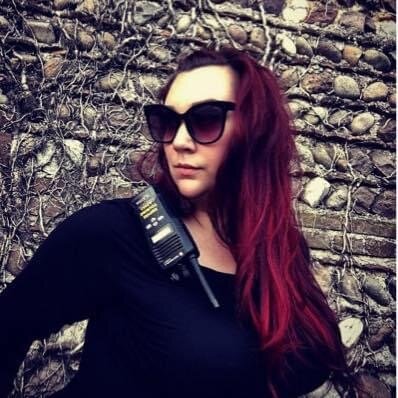Sara Parsons
Credit: Kavita Kaul
Production Coordinator / Band Assistant
Gwen Stefani / Stone Temple Pilots / Tori Amos
CHANGEOVER: Talk a bit about who you are and what you do in the industry.
SARA PARSONS: I'm Sara Parsons and I typically work as a production coordinator or band/artist assistant. Depending on who I’m working for, the role can look like a lot of different things as it’s a bit convoluted. There are times when I'm wearing five hats and carrying three different roles. Primarily, production coordinators assist the production manager and the tour manager in making sure that everything is going smoothly. You basically have a hand in just about everything that happens from taking care of the crew to travel, doing advancing, and making sure that the artist or band is taken care of with their rider requirements. You are the contact person, usually the liaison between the venue and the tour manager or production manager. It's basically taking care of everyone.
How did you get into the industry and what made you want to do this particular type of job?
I always knew that I wanted to be working in or around music in some capacity, but just never really figured out what that was. I had some experience in radio and it wasn't quite the fit. Then I became friends with a guy who, at the time, was working for Bon Jovi. We just started talking and I started picking his brain. That's when I knew it was what I wanted to do but still wasn’t really sure in what capacity. I knew females on tour mainly worked as production coordinators or ran merch. In the process of learning about the road, and the different positions, I started talking to people and networking. Out of those friendships, I gained mentors who saw something in me and helped guide me along the way. One of those mentors happened to be a big tour manager at the time. He called up a friend and said, “I know you're looking for someone for your tour. You should hire this girl.” His friend said that he had never heard of me, knew I was green but trusted that if I needed to be hired then they would give me a chance. That tour manager, named Chris Musgrave, gave me that chance and I ran with it. There was a lot of trial and error and a bit of figuring things out but, ultimately, I proved something. I was working really hard and opportunities just kept coming after that. Then I honed in on what it was that I actually enjoyed doing, which was assisting people by being a production coordinator. I worked towards those positions and eventually got hired. I was very grateful for it.
How did COVID-19 affect your touring plans and what have you been doing since the industry shut down?
No one really prepares for a pandemic. I never thought I'd see a pandemic in my life. My world came to a screeching halt. I had a very busy year ahead of me and one that I was actually quite excited about. It was the perfect schedule and all my plans just came to a stop. My last job wasn't a tour but was with Gwen Stefani’s residency in Las Vegas and then everything happened. I found myself fighting for unemployment benefits and not knowing what to do. At the end of the day I knew it was time for me to hustle again in a different way so I started doing some film work here in New Mexico, because we get a lot of that here. Now I'm working in film during this hiatus from the music industry.
How does working in film differ from working in music within the entertainment industry?
I think the biggest difference is that film is so much more regulated. In the music industry we basically work in the wild, wild west. Anything goes and there’s no rules. You just do what you have to do to get something done. In film, there's so many steps you have to do first to make something happen. Film has all this money and regulations behind it. There's a lot of red tape. It's still the same hustle, but there are a lot more rules in place. This is actually kind of refreshing because you're able to create more boundaries whereas in music you just do what you have to do to get something done.
Credit: Sara Parsons
What sound do you miss the most from touring, for example the chirp of a radio or sound of the bus door closing?
I don’t miss the chirp of a radio, that’s for sure. As cliche and cheesy as it might sound, my whole day involves getting the start of the show going. Hearing “houselights go” over the radio, followed by that immediate audience eruption of people screaming, allows you to breathe a sigh of relief. The band is on stage, the artist is on stage, they are doing their thing and all is good in the world. That's a really special moment because we are in the venue as early as 6 or 7 A.M. sometimes. It all leads up to that moment and, when it happens, a little pressure is taken off your shoulders. That sound of the audience can give you the chills because I know what it's like to be a fan. I know what it's like to be at a show. Making people happy, creating that magic, and hearing “house lights go” when the show is about to start is really magical.



